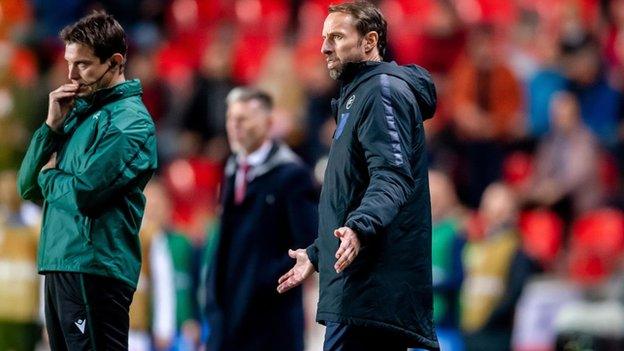Euro 2020 qualifying: Bulgaria coach believes England has 'bigger' racism problem
- Published

England's 10-year unbeaten run in qualifiers came to end against the Czech Republic on Friday
Bulgaria coach Krasimir Balakov has accused England of having a bigger racism problem than his own country before the Euro 2020 qualifier in Sofia on Monday.
The build-up to the game has been overshadowed by fears England's players could be subjected to abuse after they were targeted during the qualifier against Montenegro in Podgorica in March.
England will face Bulgaria with a section of the Natsionalen Stadion Vasil Levski closed following incidents of racism during games against Kosovo and the Czech Republic in June, with Uefa ordering that 5,000 of the 46,340 seats be blocked off for Monday's game and 3,000 against Czech Republic in November.
England manager Gareth Southgate held a meeting with his players to underline the Uefa protocol in dealing with such incidents - but the subject has provoked an angry response from the Bulgarian football authorities and now coach Balakov has also hit back defiantly.
Bulgaria Football Union president Borislav Mihaylov wrote a letter of complaint to Uefa about "unjust branding" while Balakov said: "What I can say is that I don't think we have a problem.
"In the Bulgarian championship, we have a lot of players of different ethnicities and skin colour. I don't think that we have this big problem like, for example, England do."
Asked to elaborate, Balakov added: "What I meant was that in the Bulgarian championship we've not had such problems while there have been incidents in various levels of English football involving racism, which I consider something normal because it's a big country with a very diverse population.
"But we don't have this problem in Bulgaria, I can assure you of that."
Uefa protocol decrees that in the event of racist chanting the referee will ask for an announcement to be broadcast in the stadium, and if it does not stop he or she will take the players off, initially temporarily but permanently if necessary.
England captain Harry Kane said: "We had a meeting about things that could happen but again they might not happen. There is a protocol in place but from my point of view we are here to do a job on the pitch and obviously we don't want to have to cross that bridge."
Southgate has made it clear on several occasions that England must get its own house in order on racism before accusing others, pointing out the recent incidents of racism in the game between Hartlepool United and Dover Athletic.
He said in Sofia on Sunday: "I've always said we have as many issues to resolve as anyone else. So, everyone wants us to be talking about football and for the players of both teams, the same.
"We had to prepare our players because of what happened to us in Montenegro. This was a process that we needed to go through before our next away fixtures.
"Outside of that, we trust the authorities to make sure everything is in place."
Southgate has also admitted he understood the frustrations of the Bulgarian football hierarchy, while Balakov said: "I would like to focus on football because at the end of the day we're all civilised Europeans and we're all working for this sport and that's all the matters."
Balakov, questioned on whether England's players had anything to fear, added: "Once again, it's not an issue that has happened recently in the national team games, meaning racist chants or whatever.
"I would once again advise people to think and talk about football because this is the reason why we're actually here. And we should not discuss something that has not even happened yet."
Southgate, meanwhile, was also asked about Leicester City's James Maddison, who was pictured in a casino after he was released from the squad for the two qualifiers because of illness.
He said: "Well once a player has been released from the squad, then it's up to them how they spend their individual time.
"So, I guess when there is an involvement with England, he has to learn that there's an increased interest you in you and increased interest in your personal and private life as well, so that goes with the territory.
"It's a high-profile position."